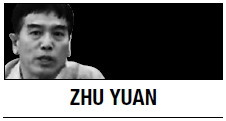Never has rule of law been talked about so much in China’s modern history. This is all because of the fourth plenary session of the 18th Party Central Committee in October, which for the first time in the history of its national plenary sessions made “governing according to law” its major topic.
But the paradox is the more the rule of law becomes a hot topic in public discourse, the more explicit it becomes that more needs to be done to turn  it into a reality. Yet what makes China’s rule of law different from its counterpart in the West are the modifiers: that it is under the leadership of the Communist Party of China and with Chinese characteristics.
it into a reality. Yet what makes China’s rule of law different from its counterpart in the West are the modifiers: that it is under the leadership of the Communist Party of China and with Chinese characteristics.
This means that the establishment of the rule of law should never be meant to challenge the ruling position of the Communist Party of China. Instead, the rule of law will try to make as many leading officials as possible perform their duties in accordance with the law, which will help consolidate the leading position of the Party as a result.
When it comes to the Chinese characteristics, the political system ― with the National People’s Congress as its legislative house and Chinese People’s Political Consultative Conference as the top advisory senator-like council and the judicial institutions under the NPC that are of key importance to the rule of law ― are different from those of the United States and other Western countries.
The question of which is higher, the law (the Constitution) or the Party, has been raised by some to challenge the earnestness of the authorities when they are talking about the rule of law. The rule of law, they believe, will never be what it should unless the law is placed above the Party.
What is tricky is that not only is the assumption, on which the discussion is based, that the CPC as the ruling Party will undoubtedly stand in the way of rule of law, arbitrary, but that by extrapolating the misdeeds and violations of the law by some Party and government leaders to the entire ruling Party, it gives people the impression that the entire political institutional framework is rotten and needs to be replaced.
What is even trickier or absurd is that the question excludes the possibility that the CPC can establish the rule of law because it is the ruling party. This then leads to the question, which party can; is there a political party more representative than the CPC in China? No one can say there is, I bet.
It is not hard to see that such a false argument is absurd, and the discussion about it is not conducive to sweeping away the major obstacles in the way of furthering the reforms to China’s sustainable economic development and social progress.
Then what are the obstacles? And why is the rule of law needed to overcome them?
The money a department leader with the National Development and Reform Commission illegally gained by abuse of power amounted to 200 million yuan ($32.58 million). And a local water works leader collected more than 100 million yuan through abuse of power. These officials who turn the power that should be used to serve the people into a tool for obtaining personal gain and their rampant abuse of power in defiance of the law are the obstacles.
That more than 50 minister-level or even higher-ranking government or Party officials and thousands of lower levels ones have been either investigated or indicted in less than two years sends an explicit message that the top authorities know pretty well that unconstitutional governance, characterized by rampant corruption by government officials, constitutes a major obstacle to the competence of the CPC as the ruling party and the country’s sustainable economic development and social progress.
Governing according to the law and governing according to the Constitution that have been proposed by the ruling Party as the theme for its national plenary session suggests that the top leadership identifies the source of the rampant abuse of power by officials. Making officials not dare to, not desire to, and not have the conditions for abuse of the power in their hands, which has been proposed as the goal to be obtained through fighting against corruption by means of the rule of law, proves that the leadership of the ruling Party not only knows where the illness is. It has also found the right medicine and therapy to cure it.
The rule of law with Chinese characteristics is the right remedy and therapy.
So what is relevant currently should be the discussion about how the medicine and therapy should be applied to not only eliminate the corrupt elements but also at the same time clean up the soil to make it impossible for new corrupt elements to breed.
This is not much a theoretical issue as a technical one that requires both courage and excellent institutional arrangements in the application of the rule of law.
By Zhu Yuan
Zhu Yuan is an editorial writer with China Daily’s opinion department. He writes editorials about social and cultural issues. ― Ed.



